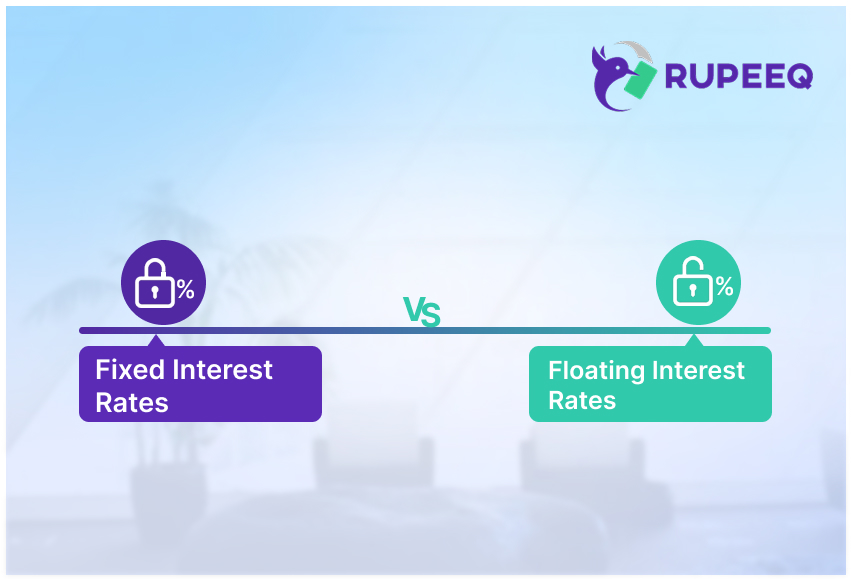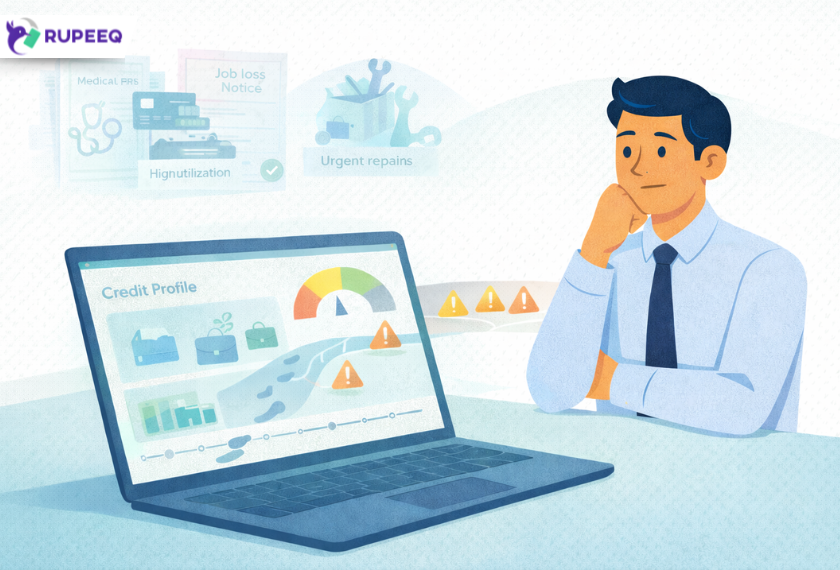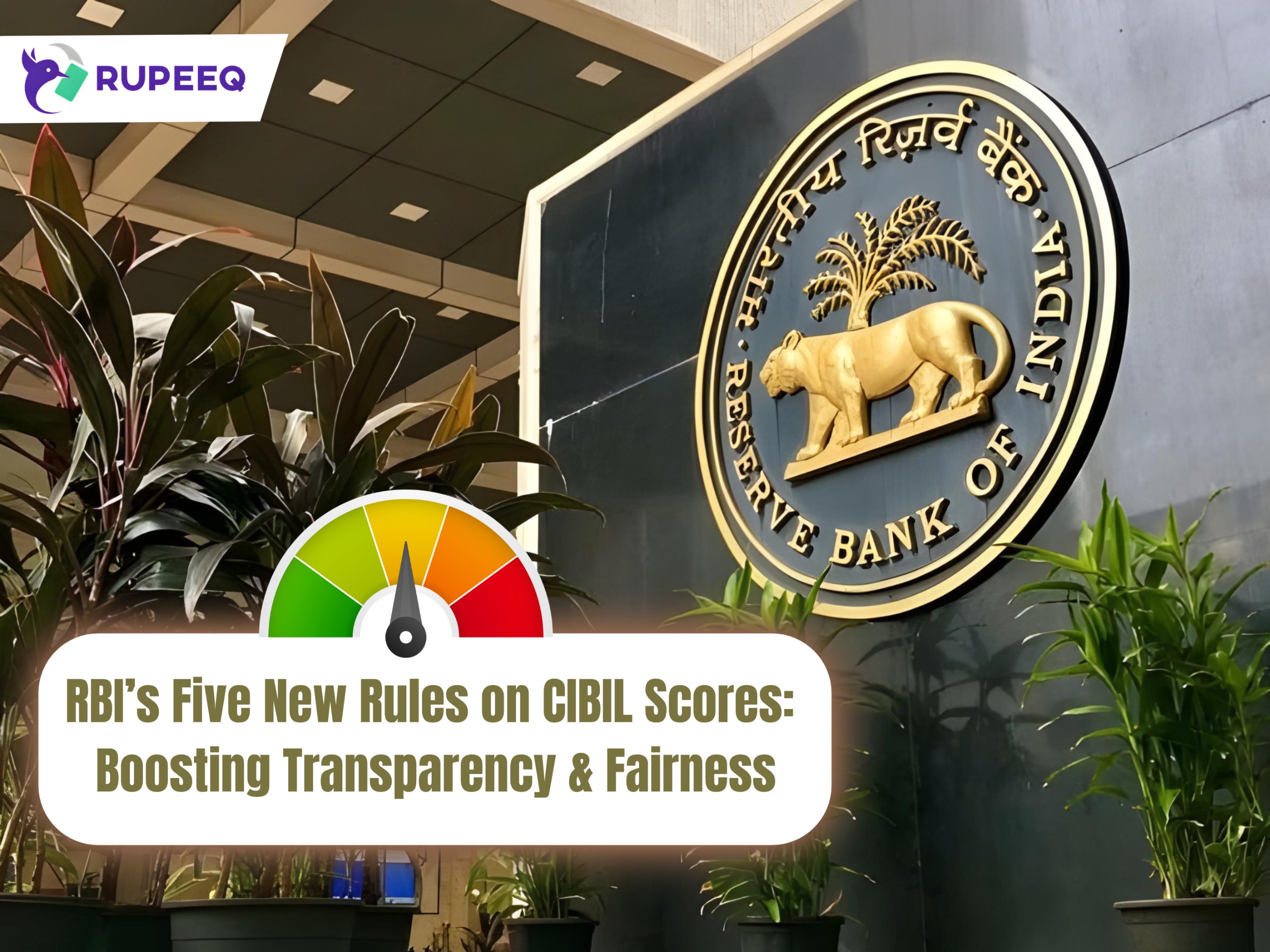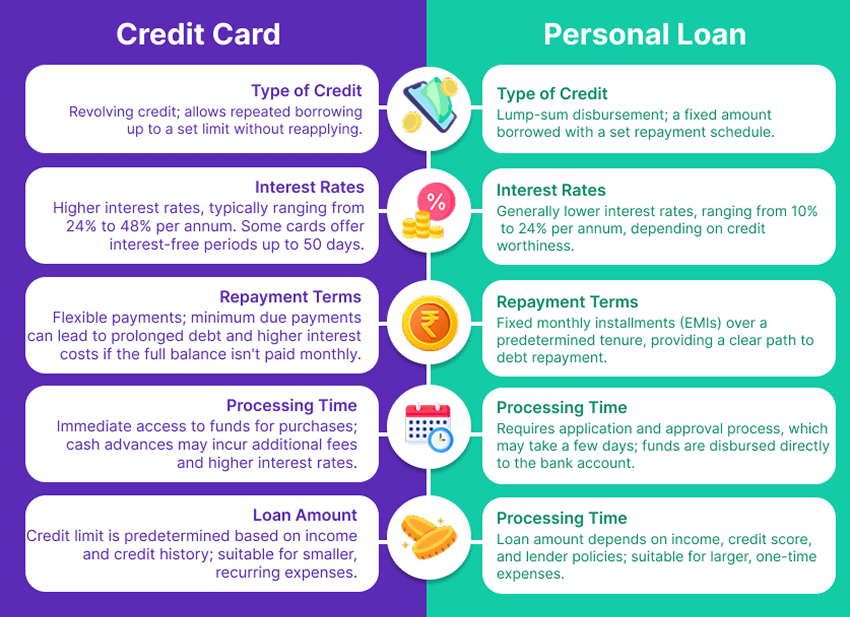When applying for a personal loan, home loan, or business loan, one of the key decisions is choosing between a fixed interest rate and a floating interest rate. This choice can significantly impact your EMIs, total interest payable, and loan repayment flexibility.
A fixed interest rate offers predictability with constant EMIs, while a floating interest rate varies based on market conditions, potentially leading to savings when rates decrease. Understanding the benefits of both options will help you make an informed borrowing decision.
In this guide, we’ll cover:
- The difference between fixed and floating interest rates
- The advantages of each and when to choose them
- A comparative analysis with examples to help you decide
What Is a Fixed Interest Rate?
A fixed interest rate remains unchanged throughout the loan tenure, meaning your EMIs stay the same every month.
Key Features of Fixed Interest Rates
- The interest rate is locked at the time of loan approval.
- Your EMIs remain constant, making budgeting easier.
- Not affected by market fluctuations (RBI policy changes, repo rate adjustments).
Who Should Choose Fixed Interest Rates?
- Borrowers who prefer stability in EMIs.
- Individuals with fixed incomes (salaried professionals, pensioners).
- When interest rates are expected to rise in the future.
What Is a Floating Interest Rate?
A floating interest rate fluctuates based on market conditions, meaning your EMIs can increase or decrease depending on changes in lending rates.
Key Features of Floating Interest Rates
- The interest rate is linked to a benchmark rate (like the RBI repo rate, MCLR, or an external benchmark).
- If market rates fall, your loan interest decreases, reducing EMIs.
- If market rates rise, your EMI increases, leading to higher costs.
Who Should Choose Floating Interest Rates?
- Borrowers who can take risks and want to benefit from rate reductions.
- People with variable incomes who can adjust their finances when EMIs fluctuate.
- When interest rates are expected to decrease in the future.
Comparative Analysis: Fixed vs Floating Interest Rates
Example: Loan EMI Comparison
Let’s compare fixed and floating interest rates for a ₹10 lakh loan with a 5-year tenure.
| Interest Type | Rate (%) | EMI (₹) | Total Interest Paid (₹) | Total Repayment (₹) |
| Fixed Interest Rate | 10% | ₹21,247 | ₹2,74,820 | ₹12,74,820 |
| Floating Interest Rate (Starting at 9%) | 9%-12% | ₹20,758 – ₹22,244 | ₹2,48,814 – ₹3,34,622 | ₹12,48,814 – ₹13,34,622 |
Key Observations
- A fixed rate provides stability, but total repayment is locked in.
- A floating rate can save money if interest rates remain low but may become expensive if rates rise.
Benefits of Fixed Interest Rates
| Advantage | Why It’s Beneficial? |
| Predictable EMIs | Helps in budgeting and financial planning. |
| Protection from Rate Hikes | Your EMI remains the same even if market rates rise. |
| Suitable for Long-Term Loans | Best for home loans or personal loans with 5+ year tenure. |
| No Risk of EMI Fluctuations | Reduces financial uncertainty for salaried professionals. |
When to Choose a Fixed Interest Rate?
✅ When interest rates are low but expected to rise.
✅ If you need consistent EMIs without worrying about market changes.
✅ If you’re a risk-averse borrower who prefers financial stability.
RupeeQ Tip – If you have a long-term personal loan (5+ years) and want stable repayments, a fixed interest rate is a safer choice.
Benefits of Floating Interest Rates
| Advantage | Why It’s Beneficial? |
| Lower Initial Rates | Usually 1-2% lower than fixed rates at the start. |
| Potential EMI Reduction | If interest rates fall, your EMI reduces, saving money. |
| Better for Short-Term Loans | If rates remain stable, short-tenure borrowers benefit. |
| More Affordable Over Time | Historically, floating rates tend to be lower over long tenures. |
When to Choose a Floating Interest Rate?
✅ When interest rates are high but expected to decrease.
✅ If you have a shorter loan tenure (1-3 years) and can handle minor EMI changes.
✅ If you’re comfortable with financial fluctuations and want the chance to save on interest.
RupeeQ Tip – Floating rates work best for short-term borrowers or people expecting interest rates to drop in the coming years.
Which Is Better: Fixed or Floating Interest Rate?
| Factor | Fixed Interest Rate | Floating Interest Rate |
| EMI Stability | Fixed, does not change | Variable, may increase or decrease |
| Risk Level | Low | Moderate to high |
| Best For | Long-term loans (5+ years) | Short-term loans (1-3 years) |
| When to Choose? | When rates are low | When rates are high but expected to fall |
| Financial Predictability | High | Low |
| Cost-Effectiveness | Expensive if rates fall | Cheaper if rates decrease over time |
Final Recommendation
- Choose Fixed Rate if you prefer stability and predictable EMIs.
- Choose Floating Rate if you want potential cost savings and can handle EMI fluctuations.
RupeeQ Tip – If unsure, opt for a loan with a hybrid interest rate, which remains fixed for the initial years and switches to floating later.
How to Choose the Best Interest Rate Option on RupeeQ?
RupeeQ helps borrowers compare fixed and floating interest rate loans from multiple lenders to find the best deal.
How RupeeQ Helps You Save Money?
✅ Compare interest rates from top banks and NBFCs.
✅ Find fixed and floating rate options tailored to your financial needs.
✅ Use EMI Calculator to estimate repayments under both interest types.
✅ Check pre-approved offers with the best interest rates for your profile.
RupeeQ Tip – Before choosing a loan, check your credit score with RupeeQ ACE to see if you qualify for better interest rates.
Final Thoughts: Choosing the Right Interest Rate for Your Loan
Your choice between fixed and floating interest rates depends on your risk appetite, financial situation, and market conditions.
Key Takeaways:
- Fixed Interest Rate is best for long-term loans where you need predictable EMIs.
- Floating Interest Rate is best if you expect interest rates to fall and are comfortable with EMI fluctuations.
- Compare lenders on RupeeQ to find the best rate option for your financial needs.
Ready to apply for a loan? Compare the best fixed and floating rate loans on RupeeQ today!







